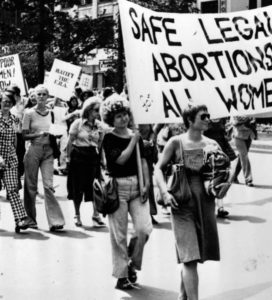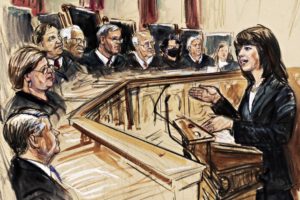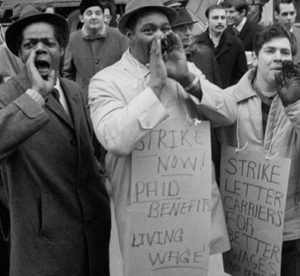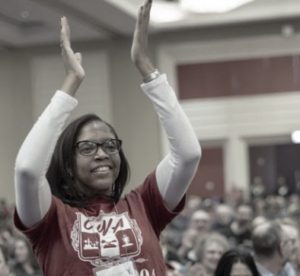Podcast: Play in new window | Download
Lead Up To Roe v. Wade Overturn
Since Roe v. Wade was decided in 1973, its opponents have mounted a sustained effort to overturn it. The Heritage Foundation and the Federalist Society (which is funded largely with untraceable dark money by wealthy right-wingers, climate damaging industries and conservative think tanks) compiled lists of anti-choice judges. Samuel Alito was helped into his seat on the court by Leonard Leo, former executive vice president of the Federalist Society.
The same funding sources power the Attorney General’s Association, which is made up of 27 right wing attorneys general. The attorneys general bring their lawsuits in front of sympathetic judges whose appointments were secured by the same entities that supported them.
Donald Trump drew his three Supreme Court nominees – Neil Gorsuch, Brett Kavanaugh and Amy Coney Barrett – from those lists. In spite of their promises to adhere to stare decisis (which means respect for the court’s precedents) Gorsuch, Kavanaugh and Barrett all voted to overturn Roe v. Wade and Planned Parenthood v. Casey (which reaffirmed the central holding of Roe in 1992).
On June 24, five right-wing Christian zealots on the court ruled in Dobbs v. Jackson Women’s Health Organization that abortion is no longer a fundamental constitutional right. Samuel Alito wrote the majority opinion and Clarence Thomas joined it as well. Chief Justice John Roberts did not vote to overturn Roe and Casey.
Alito’s draft opinion, which was leaked to Politico in May, largely became the majority opinion in Dobbs. After oral argument in December, Alito, Thomas, Gorsuch, Kavanaugh and Barrett indicated in a straw poll that they were inclined to overturn Roe and Casey.
Although we knew that the court would likely erase the right to abortion, it still came as a shock when they actually did that in the Dobbs case.
The fallout has been swift. Twenty-six states have laws that could ban or severely limit abortion. Thirteen states had “trigger laws” that would immediately ban abortion. Five states with pre-Roe abortion bans could enforce them. And 14 states would ban abortions before fetal viability. Bans and restrictions on abortion would disproportionately affect poor women and people of color.
Guest – Law and Disorder co-host Marjorie Cohn, who has written extensively about the Supreme Court and reproductive rights, predicting in several articles that the Supreme Court would overrule Roe v. Wade. Marjorie is a former criminal defense attorney, professor emerita at Thomas Jefferson School of Law and past president of the National Lawyers Guild. She has published several books and she writes a regular column for Truthout.
—-
Labor Notes Conference 2022
We live in ominous times. But one extremely hopeful development was the well-attended Labor Notes conference in Chicago over the June 19th weekend. Upwards of 4,000 mostly young workers from across the country came to the labor conference which was distinguished by its militancy and enthusiasm.
Speakers at the Friday night rally included Chris Smalls, the Amazon Labor Union president who recently led the historic Amazon warehouse workers’ organizing drive on Staten Island.
Amazon is owned by Jeff Bezos, a multibillionaire and the second richest person in the United States. Also speaking was Michelle Eisen, the Starbucks barista from Buffalo who is helping to organize Starbucks workers. Starting at zero, 160 stores have unionized in the last six months.
Speaking last was Bernie Sanders who has personally donated tens of thousands of dollars to union organizing. He spoke about the income and money inequality in the U.S. Sanders said that between Bezos and Elon Musk (the world’s richest man), the two own more than the bottom 40% of the entire U.S. population and he added that the top one percent in our country own more than the bottom 90%. He said that after the pharmaceutical company Moderna received $3 billion in Covid money from the government, its recently retired CEO got a golden parachute worth $900 million.
This is why the Labor Notes conference was organized – to explore and struggle against such wealth inequality. The organizers understand that workers produce all wealth and that we can’t fight the one percent in the traditional ways.
The old bureaucrats and labor liberals in the AFL-CIO held a convention the week before in Philadelphia. They believe in “a fair day’s wages for a fair day’s work.” The new militants who attended the Labor Notes conference understand that they may have to break the law, fight injunctions, risk fines, and mobilize sympathizers and other unions as well as the population in general. They believe in class struggle unionism.
Guest – Joshua DeVries is a long time rank and file union activist who attended the conference from his hometown of Austin, Texas. Joshua DeVries has been a local officer in Amalgamated Transit union and the Association of Flight Attendants as well as an organizer with the AFA. He writes for the magazine “Against The Current.”
———————————————




